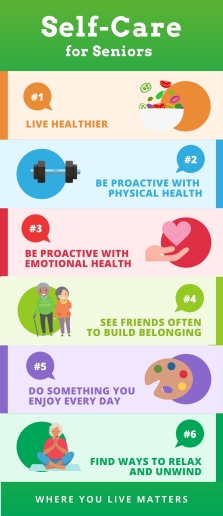12 Self-Care Tips for Seniors
It is important to practice self-care as a senior, especially during times of uncertainty. Read on to learn some of our-self care tips.

Explore:
Many older adults have cared for someone else their entire lives: first, their young children; then, an aging parent; eventually their grandchildren; possibly, along the way, an ailing spouse or friend. These seniors may never have stopped to consider the importance of self-care — or if they had, they probably didn’t have much time to practice self-care techniques.

However, as research increasingly shows, frequent self-care reduces stress and improves physical, mental, and emotional health and well-being. Research also suggests that it promotes positive health outcomes, such as fostering independence, promoting resilience, and becoming better equipped to manage stress.
What Self-Care Is
While some people may view self-care as a form of selfish indulgence, caring for yourself is actually an important part of good health and well-being. Self-care refers to intentional activities and practices that promote physical, mental, and emotional well-being. It’s the practice of taking an active role in protecting your own health and happiness, especially during periods of stress—and it’s the key to senior wellness.
Why is self-care for seniors so important?
Self-help for the elderly enhances senior wellness because it can help improve:
- Physical Health – Regular exercise, proper nutrition, and adequate hydration are crucial aspects of self-care that can improve mobility and balance, strengthen the immune system, and help manage chronic conditions.
- Mental Health – Self-care becomes vital as seniors face life transitions and potential isolation. Engaging in hobbies and learning new skills keeps the mind sharp. Socializing with friends and family combats loneliness and depression. Practicing relaxation techniques like meditation can reduce stress and anxiety.
- Independence – By prioritizing self-care, seniors can maintain their autonomy and reduce reliance on others because they feel better physically, mentally, and emotionally.
- Stress Management – Self-care helps equip seniors with the tools to handle the unique challenges of aging. Relaxation techniques can help them cope with health concerns or the loss of loved ones. Maintaining social connections provides emotional support, and engaging in enjoyable activities offers a respite from daily stressors.
- Quality of Life – Self-care for seniors is vital to a more fulfilling, enjoyable retirement and happier life.
Twelve Self-Care Tips for Seniors
Now that you know what self-care is and why it’s vital to healthy living for seniors, here are 12 great senior care tips to help you start practicing self-care right now:
- Eat healthier. Live healthier. Try to eat more nutritious foods, get enough sleep, exercise regularly, and cut down on alcohol.
- Be proactive about your physical health. Schedule regular medical, eye, and dental checkups. Preventive measures help catch small issues before they become bigger problems.
- Be proactive about your emotional health, too. It’s common for older adults to struggle with anxiety or depression. Even if you’re feeling positive about life, having a good friend to talk to and share life with is always good. Having a minister or counselor to talk with regularly can also be a significant source of support.
- Build your sense of belonging. See friends and family regularly. Consider joining a club or support group to make new friends. Schedule regular dinners or gatherings with nearby family. Reconnect with friends via social media channels like Facebook.
- Try to do something you enjoy every day. That might mean dancing, watching a favorite TV show, working in the garden, painting, or reading.
- Find relaxation methods, like meditation, yoga, reading, or a warm bubble bath.
- Get outside. The great outdoors has many health benefits, so make it a habit to walk in the woods if you can. Even a regular walk in a park can offer remarkable health benefits for your mind, body, and soul. Even if you don’t go outside, just looking at nature calms nerves and relieves mental fatigue.
- Do something you loved to do as a kid. Make a mess with finger paints, blow bubbles, or challenge friends to play Monopoly or checkers. Or buy ice cream and toppings and invite friends for an old-fashioned social.
- Learn something new. Bake a soufflé, build a bird condo, or learn to knit. If you’re unsure how, take a class or look for a local group dedicated to the activity.
- Laugh! Watch or listen to comedy. You can find all kinds of comedy and comedians via video, podcast, or website. Or get a laugh by suggesting you and your friends go to an open mic night at a local comedy club.
- Pamper yourself. Try a therapeutic massage to relieve muscle tension, stimulate the body’s natural painkillers, and boost your immune system. It can also help you feel less anxious and more relaxed.
- Give thanks, give back. A gratitude journal can help you practice mindfulness by focusing on positive experiences and boosting mental well-being. Giving back by volunteering fosters a sense of purpose and connection
Self-care is not selfish, it’s essential.
Self-care is a necessary practice that empowers seniors to live healthier, more fulfilling lives. By prioritizing your own well-being, you can better enjoy this exciting chapter of life.
Senior living can be the ultimate self-care for seniors.
If you’d like to focus more on your overall health and well-being, we’ll help you find a senior living community where you can connect with others who share your passions, find opportunities to stay social and physically active, and enjoy a maintenance-free, joy-filled lifestyle. Find community near you.
Where You Live Matters
Where You Live Matters is powered by the American Seniors Housing Association (ASHA), a respected voice in the senior housing industry. ASHA primarily focuses on legislative and regulatory advocacy, research, and educational opportunities and networking for senior living executives, so they can better understand the needs of older adults across the country.
Originally Published: April 19, 2022 – Updated On: October 17, 2024

